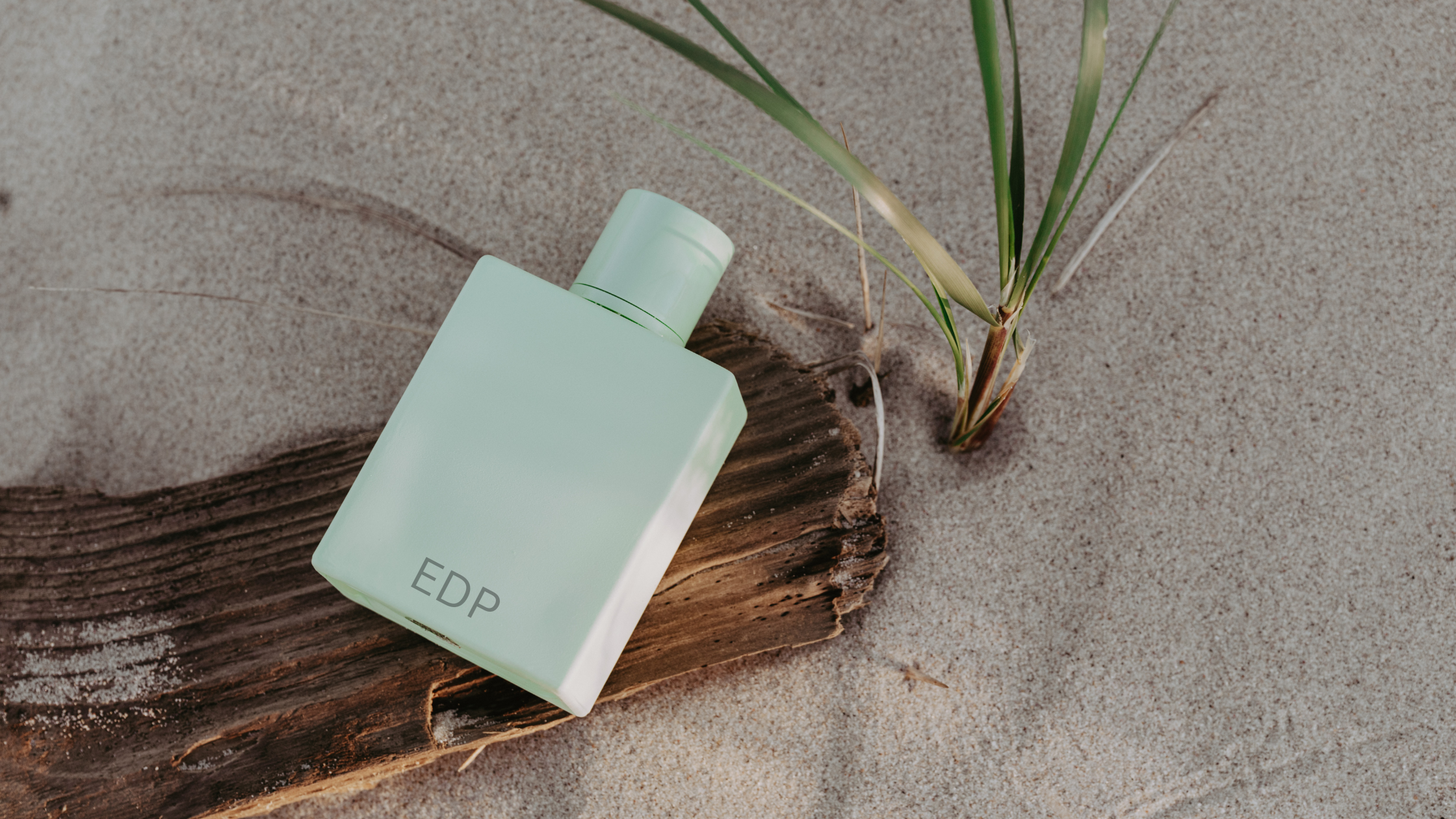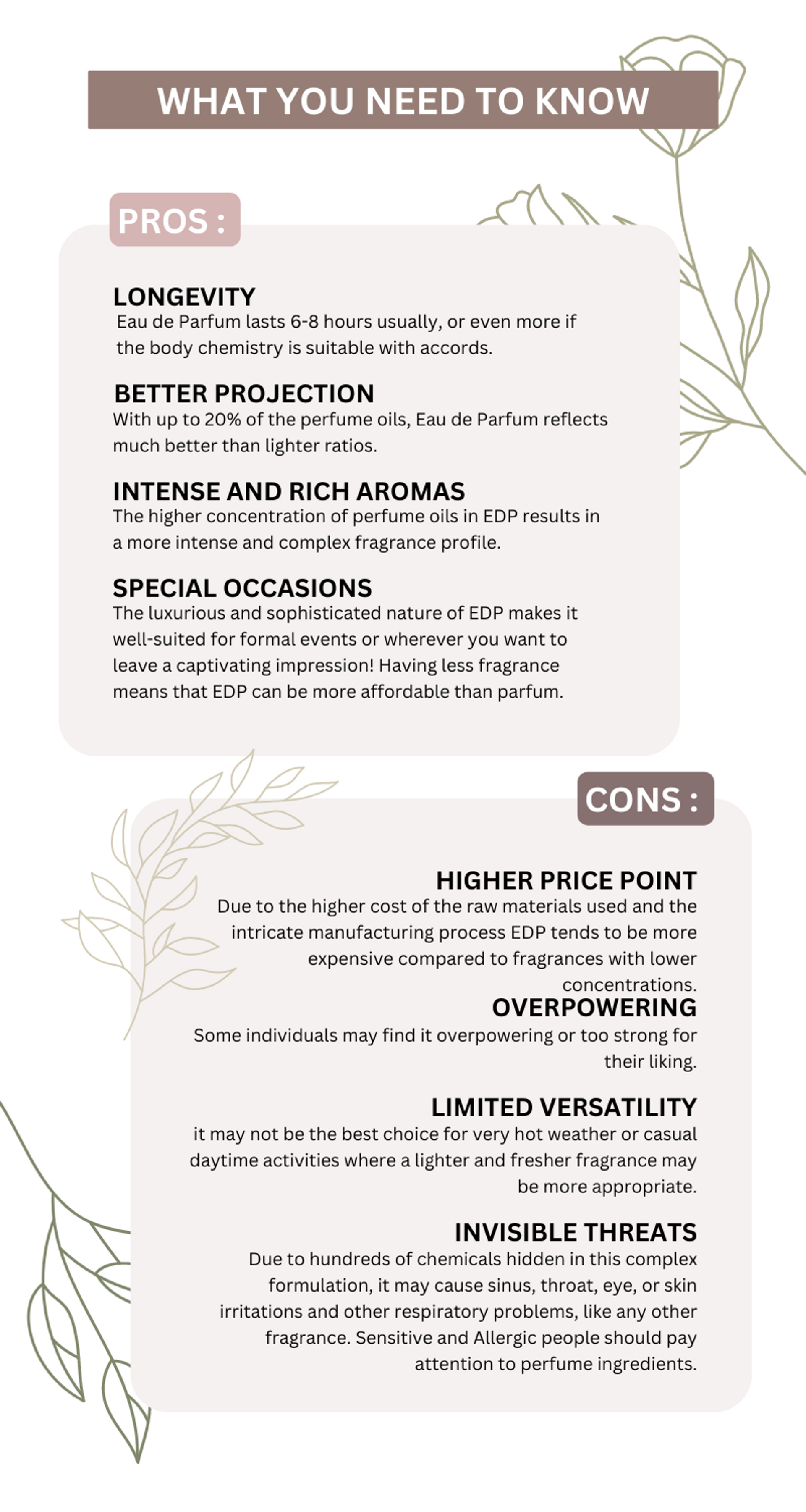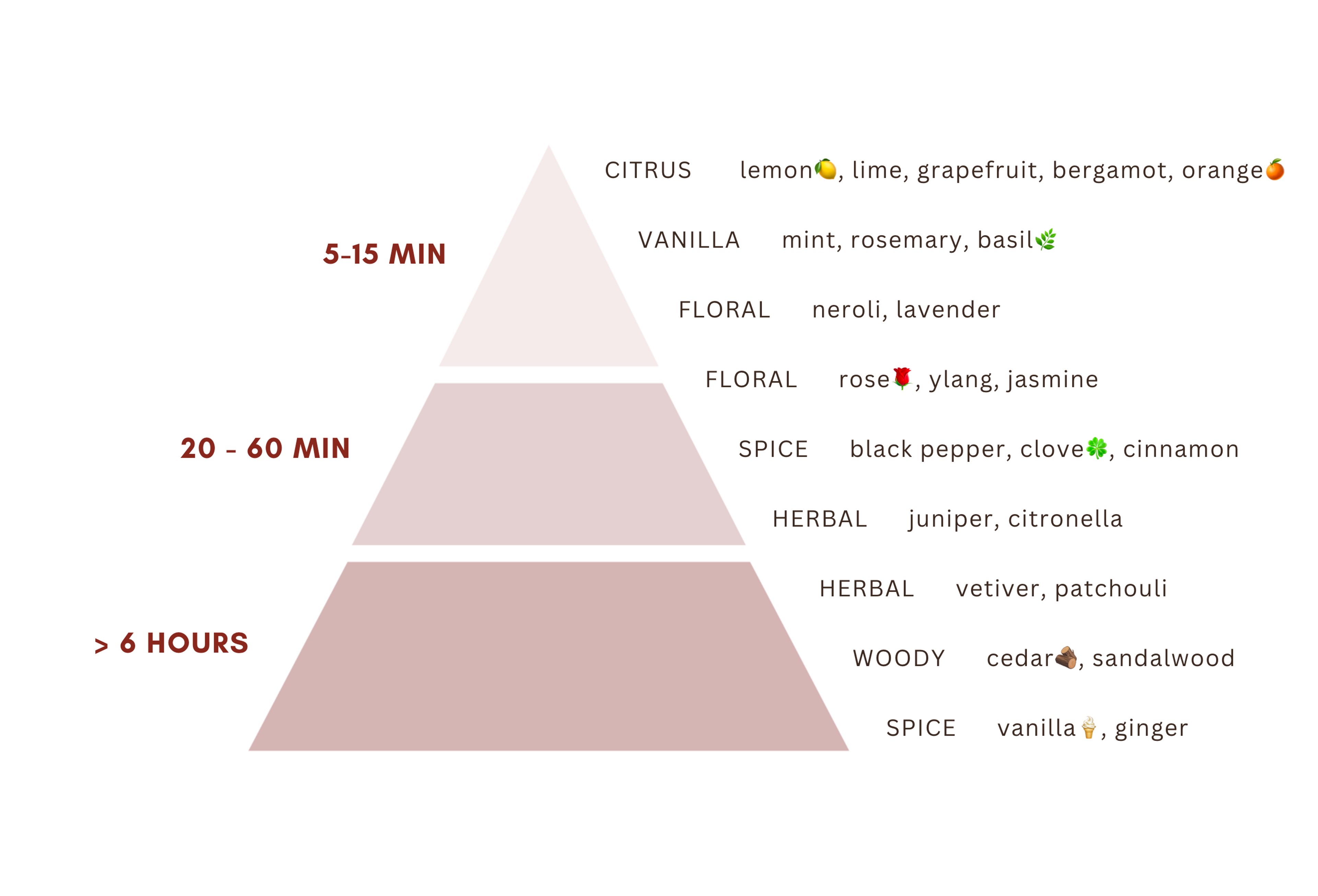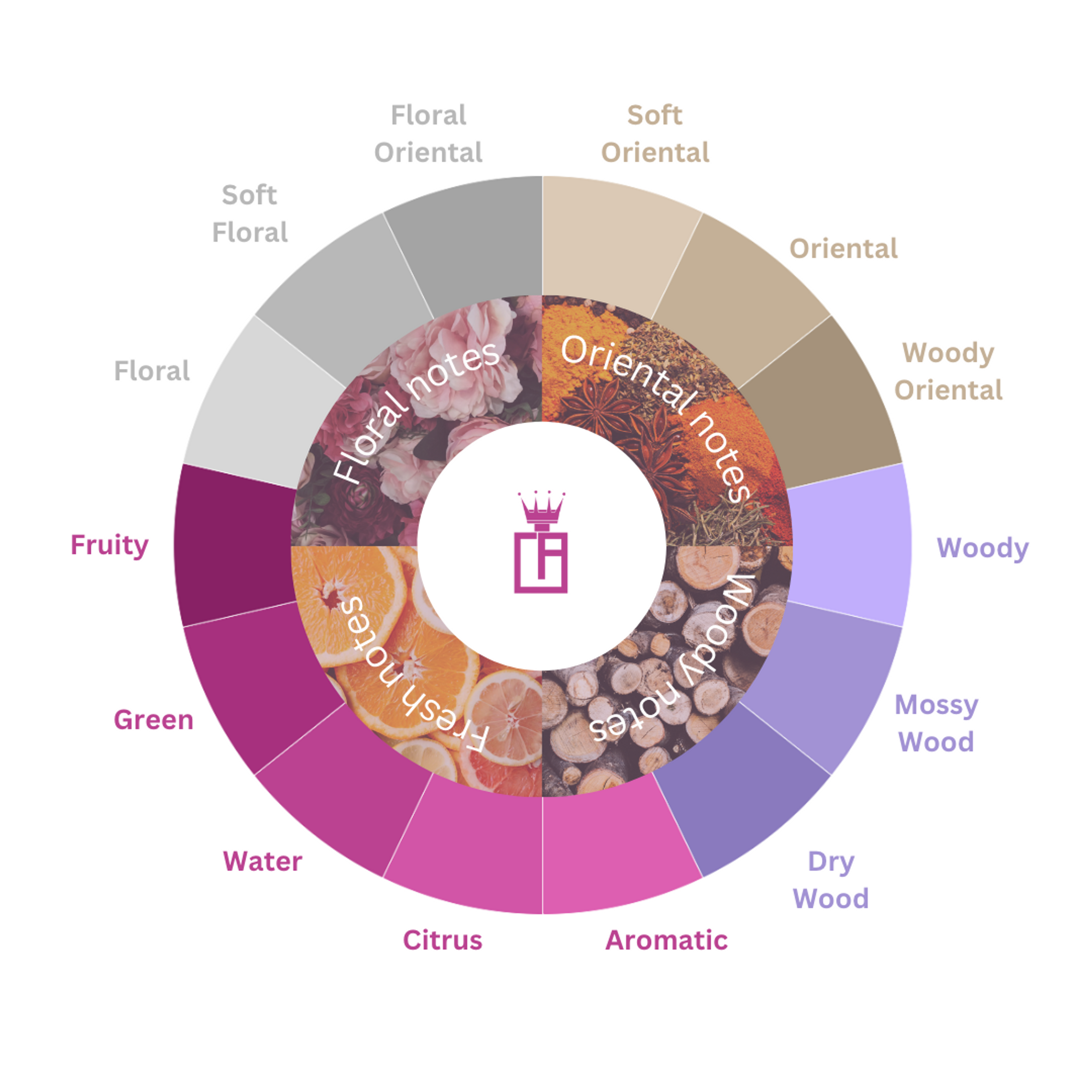
by Djordje Miladinovic
Eau de Parfum - The Undisputed Leader of Fragrances
Uncover why Eau de Parfum is the crown jewel of fragrances. Learn how it crafts your irresistible, unforgettable aroma that endures all day.
Each fragrance brings an unforgettable experience!
So many various ratios of perfumes that will make your head dizzy.
From all perfume creations, current statistical data shows that the bestselling fragrance concentration on the market is Eau de Parfum and the reasons are multiple!
Step by step we will explain the most widespread impactful perfume concentration in present-day living.
We have already talked about 6 main types in our Types of Perfumes Blog where you may find more about the different kinds of perfumes.
Chez Pierre will point out all pros and cons of Perfume Eau, where you should use it and who should wear this kind of cologne and what is the best time/weather to spray it.
Stay tuned!
The Origines of Eau de Parfum
The exact timing of when Eau de Parfum was first used as a designation is unclear, but it likely emerged during the 20th century alongside the growth and commercialization of the perfume industry.
During this period, perfume designers and manufacturers started offering a range of concentrations to cater to different preferences and price points.
Eau de Parfum, with its higher concentration of fragrance oils, became popular among those seeking a longer-lasting and more intense scent experience.
It's worth noting that the terminology and definitions of perfume concentrations can vary slightly among different perfume brands and regions.
Eau de Parfum has generally become a widely recognized term in the perfume industry to describe a concentration that sits between lighter formulations like Eau de Toilette and stronger ones like Extrait de Parfum.
What is Eau de Parfum?
Going back into perfume history origins returns us to ancient Rome and the Latin sentence "Per Fumum", which means "Through the Smoke".
It traveled across the centuries becoming the French phrase word "Parfum". Later it transformed into L’Eau de Parfum is also a French term that refers to "perfumed water".
It represents a fragrance composition with a higher concentration of perfume oils compared to other categories, such as Eau de Toilette (EDT) and Eau de Cologne (EDC).
Typically, Eau de Pafrum contains 15% to 20% fragrance oils, which contributes to its intense and long-lasting scent.
Perfume Eau is a mix of perfume oils, derived from natural or synthetic sources and carefully blended with alcohol. It is then diluted with water to achieve the desired concentration.
Due to its higher concentration of fragrance oils, Perfume Eau can linger for 6 to 8 hours or even longer, depending on the specific fragrance and individual body chemistry.
It boasts impressive projection, casting its aromatic spell in a moderate radius, leaving a captivating trail as you move.
Is Eau de Parfum the Right Choice for Your Skin Type?
Each of us possesses a unique personal scent influenced by genetics, diet, and lifestyle. When selecting an Eau de Parfum, it is essential to consider your skin type and personal preferences.
Experimentation is key to finding the perfect match. Did you know that fragrance notes from one perfume may smell distinct on different people?
Every individual's skin type interacts differently with fragrances, influencing how scents develop and perform.
We observe a division into 2 main types of skin:
- Dry Skin: Eau de Parfum's higher oil concentration can complement dry skin, as it helps retain and intensify the scent.
- Oily Skin: Individuals with oily skin may find EDP's potent nature to be well-suited, as it can counteract the tendency for fragrances to dissipate quickly.
Pros and Cons of Eau de Parfum
Eau de Parfum holds a significant share of 34,7% of the global fragrance market according to Fact. MR 2021 research.
It reflects widespread popularity among fragrance enthusiasts with a projected total growth rate of 6,2% per year.
According to the same market research, in the past few years, Eau Parfum overcame Eau de Toilette with a total share of 27,6% in 2021.

Olfactory Piramid of Eau de Parfum
Each fragrance has its own lifecycle and needs some time to pass for the perfume to reflect on the skin. When you apply Eau de Perfume on the skin it passes 3 levels of evaporation.
Top notes- usually should last between 5-15 minutes. With Eau de Parfume the top notes might be less noticeable or they might evaporate more quickly than in lighter fragrances. This is because the stronger heart and base notes of the Eau de Parfum come to the forefront more quickly.
Middle notes- should appear for the next 30 minutes. The heart notes of Parfum Eau are often a well-rounded floral or spice blend that provides a seamless transition to the rich depth of the base notes.
Base notes will show up after and they are supposed to last between 6-8 hours for a regular Eau de Parfum. Notice how each smell has developed once it’s had a chance to work with your body chemistry.

The longevity depends on many factors: your skin type, weather conditions, or fragrance oil concentration. Providing the enduring trail that makes this type of fragrance so captivating.
How Long Does Eau de Parfum Last?
The longevity of Eau de Parfum (EDP) can vary from person to person due to several factors.
All of us have individual body chemistry. The pH balance of your skin, hormone levels, and natural scent can influence how a fragrance develops and lingers on your skin.
We have already mentioned that Oily skin tends to hold scents for longer periods while dry skin has less natural moisture to retain the scent.
Because of its high oil concentration, Parfum Eau should be a great choice for those whose scent is fading away quickly.
Applying Eau de Parfum on pulse points, such as the wrists, neck, or behind the ears, allows the fragrance to interact with your body heat, enhancing its projection and sillage.
The specific formulation and concentration of Eau de Parfum can also affect its longevity. Some fragrances naturally have better longevity due to the composition of their ingredients and environmental conditions.
Environmental conditions, such as humidity, temperature, and air circulation, can impact the evaporation rate of a fragrance.
Warmer temperatures and higher humidity may affect faster evaporation while cooler weather and low humidity can prolong the scent.
Regarding all mentioned above, we may say that Eau de Parfum’s official scent radius can vary from 6 up to 10 hours, in some cases.
Make sure to store your perfume dupes in a cool, dark place, and avoiding exposure to direct sunlight can help preserve its quality over time.
5 Easy Steps to Apply Eau De Parfum
- Choose the right time: Apply Eau de Parfum in the morning hours, when your temperature is higher! You should wear cologne on clear skin best as the natural oils of the skin will not interfere with the scent.
- Choose the right place: Spray the scent on pulse points, areas where you produce the most heat, such as your wrists, neck, and behind the ears and feel how body chemistry is doing the magic!
- Apply cologne in the right amount: Studies have shown that the perfect amount of EDP to stay all day is 2 to 4 sprays. You should start with a few sprays and if you feel you need more add it. Be cautious to not overpower.
- Fragrance layering: You may use it to supplement your EDP with a matching body spray or lotion to last longer. It will also help to refresh your skin throughout the day.
- Choose the right scent: Select a scent that complements your personality. Perfume comes in various groups of notes, such as woody, floral, citrus, and oriental. They are further divided into subcategories creating a more complex experience!

Difference Between Parfum and Eau de Parfum
First, let's get some things straight.
Perfume is just a common expression for all various kinds of fragrance concentrations. They represent a combination of essential oils, aromatic compounds, and alcohol.
We use it to create pleasant odors, marking us in the interaction with other human beings. It may be Eau de Parfum, Eau de Toilette, Eau Fraiche, whatever!
But Parfum has a whole different meaning.
Parfum or Extrait de Parfum has the highest concentration of fragrance oils in the perfume industry, typically between 20% to 35%. It contains more essential oils and less alcohol than Eau de Parfum or other types of fragrances.
This makes it the most long-lasting and expensive type of perfume. It was supposed to last around 12 hours.
The main difference between Parfum and Eau de Parfum is noticeable in essential oil concentration and sillage.
Both combinations are intensive, but Parfum or Extract de Perfume offers a more complex scent that will stay longer on your skin.
Extrait de Parfum is more expensive than Eau de Parfume due to its higher concentration of fragrance oils. The choice depends on personal preference, desired intensity, and budget.
Eau de Parfum-contains between 15-20% of perume oil, lasts up to 8h, less expencive.
Extrait de Parfum-contains between 20-35% of perfume oil, lasts up to 12h, more expencive.
Eau de Parfum vs. Eau de Toilette
Eau de Parfum, with its lasting power, is ideal for evening events or special occasions. It's also well-suited for colder months, as the chill in the air can temper the strength of the scent.
Eau de Toilette is perfect for everyday wear, especially in warmer weather or during the day, as its lighter scent won't become overpowering.
Eau De Toilette (EDT) has a concentration of fragrance oils between 5% to 15% and it usually lasts up to 3 hours.
Toilette Eau has often been considered a safer option for those who prefer a more subtle scent or who are sensitive to strong fragrances.
How to Make a Decision About Which One to Use?
If you're wondering which one to use on a particular day, consider the following factors:
- Occasion: If you're going to a formal event, a date, or an evening outing, a Parfum Eau with its longer-lasting and more pronounced scent might be a better fit. For casual, everyday activities like going to work or running errands, a Toilette Eau's lighter scent is often more appropriate.
- Season and Weather: The temperature can affect how a fragrance behaves. In colder months, an EDP's stronger scent can cut through the chill, making it a suitable choice. Conversely, in warmer months, an EDT's lighter, fresher scent can feel more refreshing and less overpowering.
- Personal Preference: Some people prefer lighter, fresher scents while others lean towards richer, more potent fragrances.
- Budget: Due to their higher concentration of fragrance oils, Eau de Parfum tends to be more expensive than Eau de Toilette. If cost is a significant factor, you might lean towards EDTs.
The best way to make a decision is to sample both types of fragrance (if available) on your skin and see how they evolve over several hours. This can help you gauge which concentration you prefer in terms of scent evolution and longevity.
Eau de Parfum vs. Eau de Cologne
As we already mentioned Eau de Parfum is ideal for evening events, and special occasions and works well during colder months, as its potent scent stands up well to the chilly air.
On the other side, Eau de Cologne is a refreshing and light fragrance that is perfect for hot summer days and has one of the lowest concentrations of fragrance oils, typically between 2% to 4%. Usually lasts up to 2 hours!
Cologne Eau is typically made from a mixture of citrus oils and other botanical extracts, such as lavender, rosemary, and neroli.
Most Popular Eau de Parfumes
- Private Beach (Inspired by Kirke from Tiziana Terenzi) -Unisex- Its tropical and fruity opening notes gradually reveal a warm, sweet base. People went crazy about this one!
- Aventure (Inspired by Creed's Aventure) - Male- Awaken your inner strength and exude confidence that gives you an advantage at the start of the race!
- Salty Wood (Inspired by Jo Malone's Wood Sage & Sea Salt) -Unisex- Alive with the mineral scent of sea salt of the rugged cliffs, mingling with the woody earthiness of sage!
- Bakar (Inspired by Maison Francis Kurkdjian's Baccarat Rouge 540) -Unisex-The woody scent releases poetic alchemy of floral and fresh; highly condensed olfactory signature.
- Magnificent Black (Inspired by Yves Saint Laurent's Black Opium)- Female-Its refined scent will leave you feeling chic and confident, perfect for seducing men under the lights of the nightclub!
- Avenue 330 (Inspired by Le Labo's Santal 33) -Unisex- Imagine sitting in solitude on the rugged, wide plains of the American West, firelight on your face, indigo-blue night skies above. You. Are. Free.
- Luxurious (Inspired by LV Ombre Nomade) -Unisex- As the day passes, the desert comes alive and draws the traveler to a passionate odyssey.
How To Smell Good
Why Are Perfumes Expensive
How to Apply Cologne
Types Of Perfume
Eau de Parfum
Eau de Toilette
Eau de Cologne
Eau Fraiche
How to Make Perfume Last Longer
Where to Spray Perfume
How Is Perfume Made?
Best Niche Fragrance Houses and Perfumes
- How Many Types of Perfume Actually Exist?
- Best Ways to Apply the Cologne-According to Our Cologne Experts
- How To Smell Good - The Best Expert Advice You Will Ever Get
- Eau de Toilette or Eau de Parfum- Which One Should You Wear?
- From Morning Mist to Evening Echo: 12 Hacks to Empower Your Scent Presence
- Spritz Wisely: A Comprehensive Guide on Where to Spray Perfume
- Perfume Celebrities: Meet The Most Famous Perfume Brands In The World
- Essential Components: How Perfume is Created From Scratch